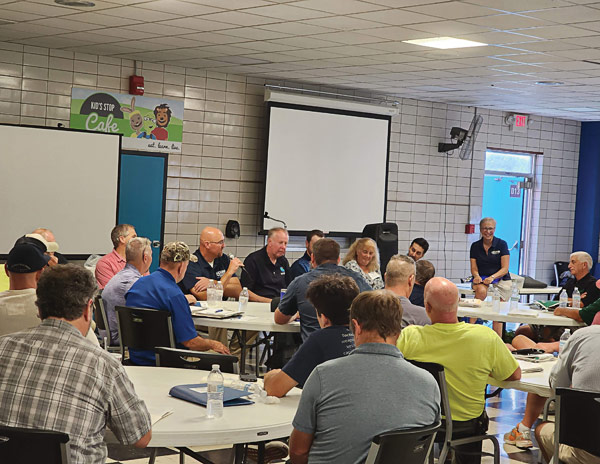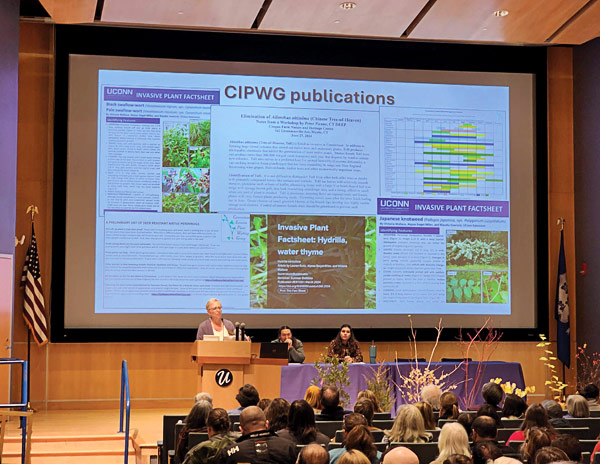UConn Extension IPM and Sustainable Landscapes Programs
 |
|
Victoria Wallace moderates a panel of turf and landscape experts at the UConn Extension School IPM Workshop in September 2023 at Old Orchard Hill School in South Windsor, CT. |
By Victoria Wallace, Extension Educator and Connecticut State IPM Coordinator
The University of Connecticut’s integrated pest management (IPM) program educates agricultural producers, green-industry professionals, and the public about environmentally sound, sustainable, science-based approaches to pest management.
UConn IPM team members conduct educational sector-specific workshops, pesticide safety training, consultations for commercial agricultural operations, diagnostic services, and applied research.
The program has developed numerous factsheets, identification guides, and outreach materials (ipm.cahnr.uconn.edu), published in English as well as Spanish (ipm.cahnr.uconn.edu/manejo-integrado-de-plagas).
The Sustainable Landscapes program includes extension education related to school IPM, turfgrass management, healthy sustainable landscapes, pollinators, and invasive species.
School IPM
The University of Connecticut’s IPM program educates agricultural producers, green-industry professionals, and the public about environmentally sound, sustainable, science-based approaches to pest management.
UConn school IPM programs provide education to CT school grounds and turfgrass professionals, which supports their care and maintenance of school properties using pesticide-free management and other IPM protocols.
Management practices by public and private K–8 school grounds and athletic field managers are limited by state legislation. Regulations established by the CT General Assembly in 2009 require the use of IPM methods on high school grounds and athletic fields and IPM tools that do not include EPA-registered pesticides on K–8 school grounds (CT General Assembly, 2009).
Therefore, in CT, K–8 school athletic fields and landscaped areas are maintained without the use of pesticides, and the management practices for the outdoor components of the school environment must continue to be addressed.
Since 2010, thirteen school IPM workshops have been developed and presented at school properties throughout CT to provide hands-on training of school grounds managers on the implementation of IPM practices for the management of athletic fields and school landscapes.
Education for school grounds managers has included:
- Training and use of weather stations for assisting in IPM decision-making
- Use of beneficials and banker plants in school landscapes
- Overseeding practices for pesticide-free athletic fields and community landscapes
- Incorporation of low-input turfgrass cultivars
- Assessment tools for school grounds and athletic fields
Due to Connecticut state legislation, K–8 school athletic fields and landscaped areas are maintained without the use of pesticides.
An athletic-field-assessment-tool app is in the process of being developed.
Significant publications for the School IPM program include:
- Best Management Practices for Pesticide-Free, Cool-Season Athletic Fields (ipm.cahnr.uconn.edu/best-management-practices-for-pesticide-free-cool-season-athletic-fields/)
- Best Management Practices for Pesticide-Free Connecticut School Landscapes (ipm-cahnr.media.uconn.edu/wp-content/uploads/sites/3216/2023/05/UConn-School-Landscapes-Best-Management-Practices.pdf)
- Athletic Field Assessment Form for School Grounds Managers (ipm.cahnr.uconn.edu/wp-content/uploads/sites/3216/2023/03/UConn-Athletic-Field-Assessment-Form.pdf)
- School Grounds Pesticide Regulations (ipm.cahnr.uconn.edu/ct_pesticide_ban_schools)
More resources are available at ipm.cahnr.uconn.edu/school-ipm.
Turf and Landscape
 |
|
Victoria Wallace speaks at the Connecticut Invasive Plant Working Group’s symposium in October 2024, Storrs, CT. |
UConn Extension supports turfgrass and landscape professionals in Connecticut with educational programming and recommendations to manage turf and landscape pests that may reduce the quality of commercial and residential landscape properties.
These recommendations support agricultural businesses in the lawn-maintenance and landscape-construction industries, as well as professionals that care for parks, cemeteries, municipal properties, conservation districts, cities, and towns.
UConn Extension and research faculty collaborate with professional associations and state agencies to develop demonstrations, workshops, and conferences. The turfgrass faculty team organizes and hosts the biennial turfgrass field day at the UConn Plant Science Research Facility, hosted most recently on July 25, 2024.
Other activities of the Sustainable Landscapes program include:
- Turf- and weed-management instruction for the UConn custom grounds ornamental and turf short course, a review class for the CT Department of Energy and Environmental Protection (CT DEEP) supervisory pesticide applicator license
- Creation of the Turfgrass Academy, a two-day program for municipal grounds and landscape professionals
- Ongoing applied research focused on the evaluation of low-input sustainable turfgrasses as part of the National Turfgrass Evaluation Program (NTEP.org) and Alliance for Low Input Sustainable Turf (A-LISTturf.org).
Publications related to these programmatic areas include:
- Connecticut Native Plant and Sustainable Landscaping Guide (ipm.cahnr.uconn.edu/wp-content/uploads/sites/3216/2023/06/UConn-Native-and-Sustainable-Plant-Guide.pdf)
- Mulch Mowing and Leaf Disposal (ipm.cahnr.uconn.edu/leaf_disposal_mulch_mowing/)
- Connecticut Native Perennial, Tree, and Shrub Availability List (ipm.cahnr.uconn.edu/connecticut-native-perennial-tree-and-shrub-availability-list/)
More resources are available at ipm.cahnr.uconn.edu/turf-landscape.
Pollinators
Pollinator education is part of the Turf/Landscape IPM programs and includes a biennial Native Plants and Pollinators Conference featuring current science-based research and information on supporting pollinators in managed landscapes.
The conference provides education about pollinator biology and conservation, as well as the incorporation of native plants to create aesthetically pleasing landscapes that support pollinator health. The program includes presentations on plant selection and teaches participants how to optimize conditions to improve pollinator habitat.
UConn Extension collaborated with CT DEEP Wildlife Division to update the Connecticut Native Perennial, Tree, and Shrub Availability List (ipm.cahnr.uconn.edu/connecticut-native-perennial-tree-and-shrub-availability-list/).
This resource supports the marketing of ecologically beneficial CT specialty crop nursery producers to enhance their economic viability, and it connects consumers with native plants that are important to pollinator health and diversity, as well as cultivating resilient ecosystems.
The Native Plants and Pollinators Conference discusses incorporating native plants to create aesthetically pleasing landscapes that support pollinator health.
In 2022, a small demonstration meadow was established at the UConn Plant Science Research Facility in Storrs, CT, to serve as an educational resource to address questions about meadow establishment and maintenance.
The objective of this project is to evaluate meadow establishment practices, planting methods, and weed-management strategies that are realistic for school grounds managers in contexts where meadows may be incorporated into the school landscape, but where they must be established without the use of herbicide products due to the current legislation.
More resources are available at ipm.cahnr.uconn.edu/pollinators.
Invasive Species
UConn invasive species education provides information on the identification of non-native, invasive plants and insects and offers management solutions.
I serve as co-chair of the CT Invasive Plant Working Group (CIPWG), which hosts a biennial invasive plant conference. The most recent symposium was held on October 29, 2024, and featured regional and local experts as well as citizen volunteers sharing practical solutions for invasive-plant management and actions needed to promote native species and improve wildlife habitat.
Symposium information (cipwg.uconn.edu/2022-symposium/) is available on the CIPWG website (cipwg.uconn.edu).
Currently, there are limited educational programs in Connecticut that help individuals to correctly identify and proactively manage invasive plants. My team and I recently completed a needs assessment through surveys and focus groups to better understand the needs of CT stakeholders related to invasive plant species. This assessment will help direct future invasive plant education.
UConn Extension has produced a series of invasive plant profile publications (ipm.cahnr.uconn.edu/invasive-species/), with identification and management recommendations, as well as a jumping worms fact sheet (ipm.cahnr.uconn.edu/jumping_worms/).
More resources are available at ipm.cahnr.uconn.edu/invasive-species and cipwg.uconn.edu.
About the Author
 |
|
Victoria Wallace |
Victoria Wallace is the extension educator for sustainable landscapes at the University of Connecticut and the current IPM team leader.
Wallace is recognized as an expert in turf and sustainable landscapes and is a frequent speaker at regional and national programs. She has provided essential school IPM programming and extension support since her tenure at the University of Connecticut began.
She has served as president and board member for the New England Sports Turf Managers Association (NESTMA), the CT Nursery and Landscape Association (CNLA), and others. Through these organizations, she has spearheaded educational symposiums, conferences, and field days.
In 2021, Wallace served as the chair of the committees that developed the national Best Management Practices for the Sports Field Manager: A Professional Guide for Environmental Sports Field Management (www.sportsfieldmanagement.org/knowledge_center/bmps/), as well as the chapter document for NESTMA in 2023.
Wallace received the 2024 Outstanding Achievements in Integrated Pest Management Award from the Northeastern IPM Center (neipmc.org/go/ApbM) for her impactful work in empowering green-industry professionals to successfully practice IPM.
Wallace teaches an effective and environmentally sound approach to managing pest issues while sustaining optimal plant health. She encourages a proactive, holistic IPM approach that challenges clientele to be innovative and willing to employ multiple tactics.
